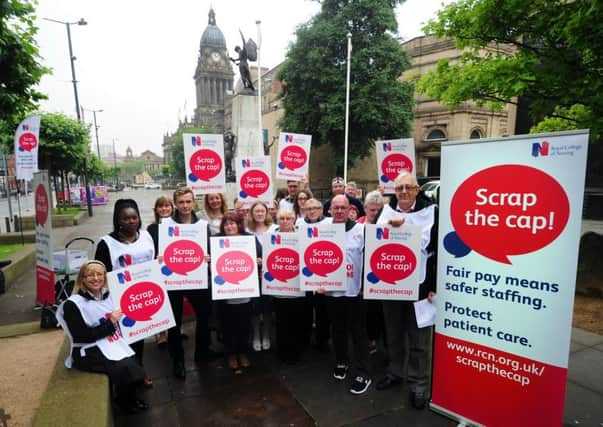YP Comment: Will it now pay to raise taxes? Tories and the public sector


Yet, while the mixed messages from Ministers in the chaotic hours preceding last Thursday’s vote on the Queen’s Speech revealed the full extent of the chaos and confusion enveloping the Government, a significant number of Tory MPs and Ministers appear to agree with Labour leader Jeremy Corbyn that such workers have already paid the price for seven years of austerity.
However, while Environment Secretary Michael Gove said that the Government will await the recommendations of the pay review bodies, it’s still open to question whether the country can afford such a spending spree when the budget deficit is forecast to be in excess of £60bn this year, and national debt now stands at an eyewatering £1.7 trillion.
Advertisement
Hide AdAdvertisement
Hide AdBy scraping together £1bn to effectively buy the votes of MPs from Northern Ireland’s Democratic Unionist Party, the Government finds itself vulnerable to every reasonable request for extra spending, and the Conservatives are clearly rattled by the extent to which Mr Corbyn’s unique brand of leadership is changing the dynamics of politics and economics.
Yet Mr Gove was stumped when asked to explain how this £1bn was being funded. He talked about a growing economy but the plain fact of that matter is that such a policy will require more borrowing, an increase in taxes or unpalatable cuts to other budgets. And this goes to the heart of the dilemma on incomes – are people willing to pay more money to HM Treasury to give teachers, NHS staff and emergency services a pay rise and are the Tories, the traditional party of low tax, prepared to countenance this? If not, what is their plan? The country has a right to know.
New housing policy must be built
FOR very understandable reasons, the number one housing priority is making sure the victims of the Grenfell Tower tragedy have the practical and emotional support that they require as calls grow for commissioners to take control of Kensington and Chelsea Council.
Yet, at some point, the time will come for a national debate about the future provision of social housing. Should more tower blocks be built because of land constraints in urban areas? If this is not desirable because of safety concerns, where should new homes be built?
Advertisement
Hide AdAdvertisement
Hide AdOne option is to release more green belt land at a time when 425,000 new homes are already earmarked for land previously protected due to its special status. Yet, according to the Campaign to Protect Rural England, more than 70 per cent of planned properties are so expensive that they can’t be described as ‘affordable’.
The significance of this can’t be under-estimated. Even though Theresa May’s government is effectively operating on a day-to-day basis, it does need to find a way to confront the longer-term policy challenges.
It’s in the national interest to give councils new financial powers to invest in new housing – this should be viewed as an investment in the future – while also ensuring that available land is used more wisely. It seems counter-productive, for example, to build five luxury homes on a green belt site when 10 smaller houses could be built which are within the financial reach of first-time buyers. If Mrs May wants to demonstrate that her Government does, in fact, have firm foundations, she should not hesitate to look again at housing policy.
Taking the lead
THE transformation of Leeds into one of the country’s top leisure, cultural, retail and sporting destinations should be a source of pride for the whole county.
Advertisement
Hide AdAdvertisement
Hide AdIf visitor and tourism numbers continue to increase, there’s every likelihood that people will also take advantage of attractions, and events, across the region.
Yet, as the North’s more dynamic cities reinvent themselves, Leeds – and other locations for that matter – need to come up with new ways to broaden the size and scope of this sector of the economy.
For, while Leeds harbours ambitions of becoming the 2023 European Capital of Culture, it’s surprising that a city of this stature does not have the facilities, or infrastructure, to host those national and international conferences which are proving so profitable to rivals like Manchester, Liverpool and Birmingham.